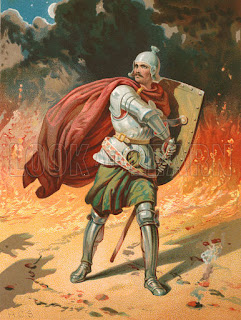Lord, Is It Warfare? Week 2, Day 2 & A Short Rabbit Trail
This study guide, devotional Lord, Is It Warfare? has been designed in such a way that we are
asked questions that aren’t leading but rather to help us to get to an
understanding of what the Bible has to say about spiritual warfare. Years ago, I can remember a writer, whom I
have long forgotten, giving the advice that we are to interrogate the text when
we are studying Scripture. This is a very
effective way to gain more than just a superficial knowledge of Scripture. If you can recall the old description of an
adverb, it is a word that describes who, what, when, where, and to what extent. Those are useful questions to ask when you
are looking at the Bible.
When we take a first look at the enemy, who is deceptive,
deadly, and intent on destroying everyone who is in allegiance with Jesus
Christ, we find him in Genesis 3. A
couple of other OT chapters also give a description of him. There is the brief allusion that Isaiah makes
in Isaiah 14 and there is a bit longer region in Ezekiel 28. It is a passage that has reference to the
king of Tyre but many biblical scholars also hold that imagery used by Ezekiel
would fit the bill for the devil also.
What causes us to come to this view is because of the words that the
prophet uses would in no way entirely describe a man. While there are some descriptions that would
fit a human king, there are also words that help us to see that the devil would
qualify in this description also.
What follows are the characteristics that are found in
the ESV:
v. 12
·
The signet of perfection was on him.
·
He was full of wisdom.
·
He was perfect in beauty.
v. 13
·
He was in Eden.
·
Every precious stone served as a covering: sardius, topaz, diamond, beryl, onyx, jasper,
sapphire, emerald, and carbuncle; all of which was crafted in gold. (NOTE: The devil is often portrayed as a dark
character who is deformed and terribly ugly.
But the Bible would seem to indicate that the devil is a very desirable
figure to be associated with. He is
someone that most would want to be around.
It is the finished work of sin that creates all of the calamities and
destruction of life.)
v. 14
·
Anointed guardian cherub. (NOTE: This opens up the possibility of looking into
the various levels of authority and hierarchy among angels and demons.)
v. 15
·
Blameless in his ways.
·
But unrighteousness found you. (NOTE: Sin always leaves a crippling effect on our
lives. It can change heaven into hell.)
v. 16
·
He was filled with violence in the midst of
God. (NOTE: This is a hint at the
war that took place in heaven. Maybe you
are familiar with the works of the old poet/dramatist/writer John Milton. He writes in his Paradise Lost about the battle that took place in heaven with the
fall of the devil. The description he
gives as he allows his imagination to take you to the council chambers of the
devil are quite thought provoking.)
·
I (God) cast you (the devil) as a profane thing
from heaven. (NOTE: This is the same
description that Scripture gives of Esau.)
v. 17
·
His heart was proud because of his beauty. (NOTE: Multiple biblical characters fall to this
trap that the devil so carefully lays.
Absalom, Delilah, and perhaps even Jezebel can be identified with this
crowd. Note the times that the Proverbs
speaks of men and women who are vain.
Their vanity ends up being a huge liability for them.)
·
His wisdom was corrupted because of the beauty
and splendor.
·
He was cast to the earth. (NOTE: We ought to give great consideration to where
the devil was and the position that he held prior to being expelled from
heaven. Anything that removes us from
the presence of the Lord is not worth the cost of fellowship with the Lord.)
v. 18
·
He was guilty of committing unrighteousness in
his trade. (NOTE: The trade of the devil
was music and worship. It would suffice
to make the connection to the fact that he attached worship, music, and evil
together in such a way that it caused pride to move him to spiritual
danger. This would be a crucial and
necessary lesson for all who are involved in leading worship and leading music
in a holy setting.)
·
He profaned his sanctuary (heaven).
·
He was placed into a place of shame (ashes on
the earth).
v. 19
·
All who know him and see him are truly appalled
at what has happened to him.
·
He will come to a dreadful end.
At this point, we have finished the content for Day 2 but
as I was working through this, there were several rabbit trails that came to
mind from Scripture and I would like to follow one of them. As noted in a previous post, C. S. Lewis
noted that the two dangers are to totally ignore the devil and the other is to
become obsessed with him. While there
are very dark forces at work in opposition to all who have been Spirit-filled,
we can also be certain that we are not without responsibility in our walk with
the Lord. Therefore, I believe that it
is spiritually immature and irresponsible when there is a tendency to excuse
behavior because we are under “spiritual attack.” This was noted in a post earlier that there
are demons behind idols (1 Cor. 10:20) that make their way into our lives,
however Paul was very clear that there is a responsibility to seek and pursue
holiness and fruitfulness in our walk with the Lord.
When he was addressing the problems at Corinth we never
see where that he confronts demons of division, immorality, or lawsuits. Here is what Paul says, “Fix your dissensions
by becoming unified through the work of reconciliation” (1 Cor. 1:10). When there is the darkness of incestuous
immorality in the church, he does not tell them to take on the demon of
immorality but rather they are to exercise righteous and authoritative judgment
and remove the sinning member (1 Cor. 5).
When they have problems with civil cases and are seeking to sue each
other, he urges them toward giving up their selfishness that has put them into
a place of confrontation (1 Cor. 6). When
there is chaos at the communion table, Paul never tells them to cast out the
spirit of disorder, gluttony, or drunkenness but rather he implores them to
examine themselves (1 Cor. 11:28, 33).
Later on in this study, we shall come to the portion of
text in Ephesians 6 that speaks of the spiritual armor. As have already noted that Ephesus was a
hotbed of the occult, what we find in that epistle are some very practical
matters of Christian living. The
Ephesians 4 portion of “put off. . . put on” are very helpful when we see the
empowering work of the Spirit is not necessarily for men to fight devils but
live their lives in sober, holy, and reverent state. The Ephesians 5-6, wives are to submit to
their husbands, husbands are to love their wives, and children are to obey
their parents and employees (slaves. . . lol) are to be model employees. So before a pastor gets up and romps and
stomps rebuking devils of alcohol, fornication, cigarettes, and so forth. . .
before a husband starts rebuking demons of divorce and mouthy women. . . maybe
he needs a prayer meeting and a sharp Bible study to help him to see the way
and his personal responsibility to walk out the disciplines of holiness that
God has for him. This is how the Word
works!!!
There are practices that we should develop in our lives
as saints of God that cause us to be more Christ-like. The practice of saying, “The devil made me do
it” is not one of those. I am gripped by
the character traits of spiritual leaders that Paul wrote for us in 1 and 2
Timothy and Titus and I long to model them in my own life. To do so, I have to seek the Lord as I read
them, muse on them, memorize them, and let the gentle work of the Holy Ghost
draw me on as a greater anointing and maturity.
They are incorporated into my steps as I choose to allow my heart to be
submissive to the Word. I will not have
them because I walk around casting out demons of this-and-that. The enemy would love to turn me into a
cartoon character by stimulating this kind of activity. This is not the way to walk. . . that would be about as foolish as handling snakes, drinking strychnine, and juggling fire. . .
More tomorrow. . .
Thanks for reading. . .







Comments